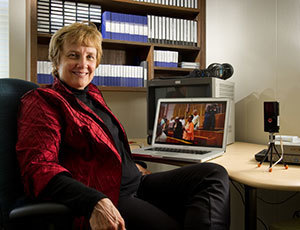 Margot Fassler
Margot Fassler
With the support of a Lilly Endowment grant of $1.9 million, Sacred Music at Notre Dame (SMND) is poised to help congregations across the region renew worship practices and enliven musical expression to engage people more deeply, across the generations.
The grant will enable SMND to begin building creative partnerships between academia and communities of worship and to sponsor activities designed to teach sacred music to young people. A central project will be sending graduate students from Notre Dame’s newly founded Doctor of Musical Arts and its successful Master of Sacred Music programs into local churches to strengthen existing children’s choirs or establish new ones. Applications will be available by March 15 for churches interested in hosting an organist or choral conductor from Notre Dame for a period of two or three years.
Projects funded by the grant will be led by Margot Fassler, co-director of SMND and Keough-Hesburgh Professor of Music History and Liturgy in the College of Arts and Letters’ Department of Theology and Department of Music.
“The long-term vision for this work is to promote the transformation of a large region in Northern Indiana into a hotbed of vibrant musical practices in a variety of faith traditions,” Fassler says. “The work done with and for children and youth in musical training and theological understanding will lay a foundation for the practice of church music well into the next generation — and beyond.”
Toward that end, the grant also provides seed money for the formation of the Notre Dame Children’s Choir, a laboratory choir to be conducted by Mellon Post-Doctoral Fellow Mark Doerries and accompanied by Hillary Doerries, who will also manage the choir.
Finding a creative balance between the old and the new is the key to successful church music programs, Fassler says.

“Yet much traditional repertory in nearly every Christian tradition has been lost in recent decades,” she notes. “Christians are often out of touch with their own musical heritage, and skilled musicians of the recent past have often not been replaced in kind.
“We seek both the learning of new, well-crafted music and the restoration of traditional repertories through renewal of musical skills for the young. The children we teach will be the future congregants, lay leaders, church musicians, priests and pastors, and scholars involved in music and the arts,” Fassler says. “By encouraging the children’s choirs of today, we prepare for the churches of the future, both choir members and congregants.”
Fassler says this work is inspired to a great degree by the Vatican, which calls for preserving the treasury of sacred music, active congregant participation with full heart and full voice, and well-trained children’s choirs. By the end of the four-year grant, she anticipates more than a dozen established children’s choirs across Northern Indiana.
Endowment grant funds will also be used to bring young people from across the region together to share in fellowship related to their musical training with activities such as an annual children’s choral festival at Notre Dame as well as the on-campus “lab” children’s choir.
Another key to the success of these sacred music projects, says Fassler, is creating an active network of scholars and church leaders. “Our project will forge strong partnerships between practitioners in the field, church musicians, priests and ministers, and Notre Dame graduate students and their faculty,” she says.
“One of our goals is to encourage every community we work with to find its own voice and offer praise with sustaining power and joy.”
Fassler also hopes this grant will help remedy one of the most significant problems facing church music programs today: the perception that musical training is, somehow, elitist. “It is essential that our work engage this misperception on a profound level,” she says. “To this end, the laboratory choir we will create will make financial provisions available to ensure that able and interested children of diverse backgrounds are included.
“So often, stories told by an adult who loves the church include musical memories,” she says. “We hope to make many strong and nurturing experiences possible for a great number of kids throughout our area.”
Lilly Endowment Inc. is a private, philanthropic foundation that supports the causes of religion, education and community development.
Originally published by Arts and Letters at al.nd.edu on Jan. 21, 2013.